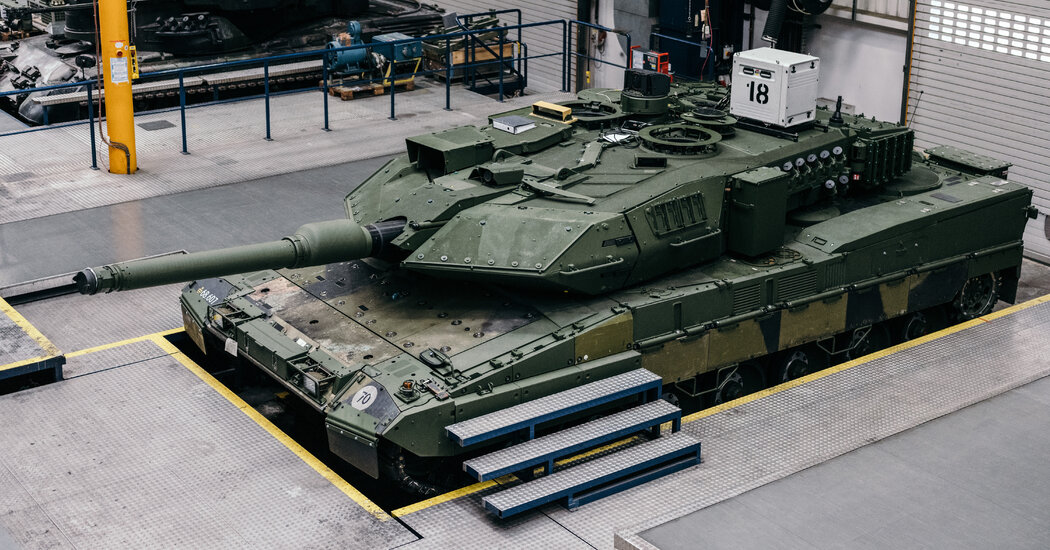Tanks for Ukraine
Yesterday, Germany and the U.S. pledged to send tanks to Ukraine after weeks of diplomatic maneuvering. The pledges could unlock a wave of additional aid ahead of an expected escalation of fighting in the spring.
It could take a year or more for 31 American M1 Abrams tanks to reach the battlefield. But the U.S. promise did clear the way for Germany to commit to sending 14 of its Leopard 2 tanks, which could arrive in several months.
The decision by Germany to authorize other nations to transfer their own Leopards prompted officials in Finland, the Netherlands and Spain to say that they would seek to send tanks to Ukraine, or that they were open to doing so.
Fighting: The announcements come at a critical juncture. Ukraine said yesterday that its forces had retreated from Soledar, a key town near the eastern city of Bakhmut.
Natural gas runs short in China
China is the latest country to be affected by the global energy disruptions that followed Russia’s invasion of Ukraine. But after spending on costly “zero Covid” measures, local governments have few resources to buy expensive natural gas.
China’s national government has told local governments to provide heat, but it has not given them money to pay for it. Mass-testing campaigns in the final days of “zero Covid” drained their coffers. As a result, provincial and municipal governments have reduced customary subsidies for natural gas, which used to keep a lid on heating bills.
Now, gas is effectively being rationed, with households receiving the minimum needed for cooking food but very little for heat. Tens of millions of people are angry, and their frustration has spilled over to social media. “Nothing seems to be working, partly because nobody seems to have much cash,” one expert said.
Weather: China, like Europe, has long relied on Russia for some of its gas. But Europe has had an unusually warm winter, which has pushed gas prices lower there and helped countries get through the squeeze. In China, by contrast, unusually bitter temperatures have pushed gas prices higher.
Big picture: Climate change may usher in an era of trade wars.
Opinion: It’s in the best interest of the U.S. to help China develop new treatments to blunt Covid’s spread, Michael V. Callahan argues.
Modi suppresses a documentary
A new BBC documentary is critical of India’s leader. Although India’s government has not banned it outright, it has gone to great lengths to suppress the film, online and on campuses.
“India: The Modi Question” focuses on the Hindu-Muslim riots in Gujarat in 2002, which killed about 1,000 people, most of whom were Muslim. Critics accused Narendra Modi, then the chief minister of Gujarat, of clearing the way for the carnage, or turning a blind eye to it. One major revelation in the film: A previously unreported British investigation found Modi “directly responsible” for the mass killings.
Modi’s government is getting help from international social media companies. Alphabet, YouTube’s parent company, cooperated with India to block segments from appearing on the site. Even Twitter, which has historically resisted barring content at India’s direction, also blocked posts linking to the footage.
Reaction: Students are enduring police detention and attacks from masked men to set up screenings. “By doing this,” a student activist said, “they are making this documentary more popular, and now everyone wants to watch it.”
Details: Modi’s government is deploying “I.T. rules,” passed in 2021, that allow it to suppress virtually any online information. The government has historically used the laws in its ongoing crackdown on press freedom.
THE LATEST NEWS
Asia Pacific
Members of Gen Z love distorted photos: They’ve gone for the 0.5 ultra-wide-angle lens, an A.I. portrait generator to simulate a painting and the lo-fi digital camera for grainy nostalgia.
Now, they’re into the traffic mirror. (Some commenters on TikTok praise them as “bus driver core,” though the fish-eye look recalls the 1990s, which Gen Z often emulates.) “It looks funny,” a 24-year-old said. “But it looks funny on purpose.”
Lives lived: Balkrishna Doshi, the first Indian architect to receive the Pritzker Prize, helped develop Indian modernism. “We wanted to find our own identity,” he said. He died at 95.
SPOTLIGHT ON AFRICA
A diplomatic contest
The Russian foreign minister, Sergey Lavrov, arrived in Africa this week for his second diplomatic tour in less than a year. While Russia has relied on a longstanding diplomatic network on the continent, Ukraine has far fewer embassies there.
Still, as the war in Ukraine nears the end of its first year, many African countries have remained neutral. Lavrov’s visit began in South Africa, with stops in Botswana and Eswatini before he headed to Angola, an important oil producer. Along the way, he extended invitations to a Russia-Africa summit in July. The trip overlaps with tours by two top U.S. officials: the ambassador to the United Nations, Linda Thomas-Greenfield, and Treasury Secretary Janet Yellen.
Yellen, who was visiting Senegal, Zambia and South Africa, warned that Russia’s “barbaric aggression” was hurting African economies, particularly through rising food prices.
Thomas-Greenfield said, “Africa is key to pressuring Russia because we need to send a strong, unified message to Russia that what they are doing in Ukraine is unacceptable.”
Lavrov is expected to be back in the coming weeks for a planned visit to North Africa. —Lynsey Chutel, a Briefings writer in Johannesburg

Tinggalkan Balasan